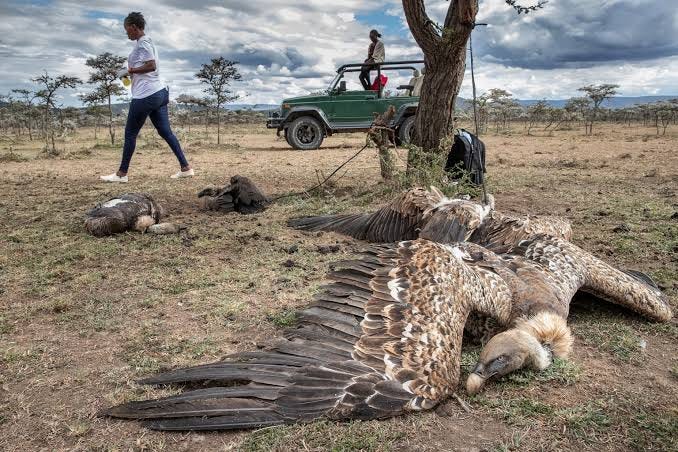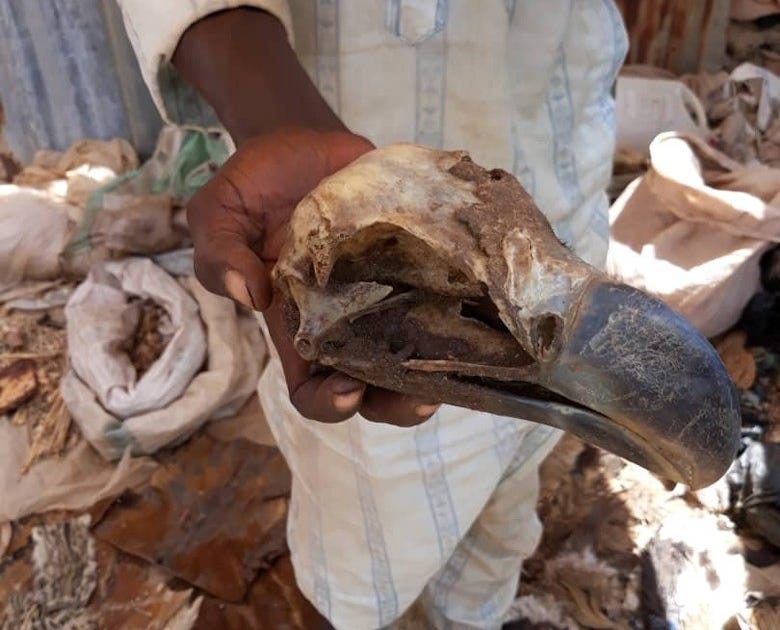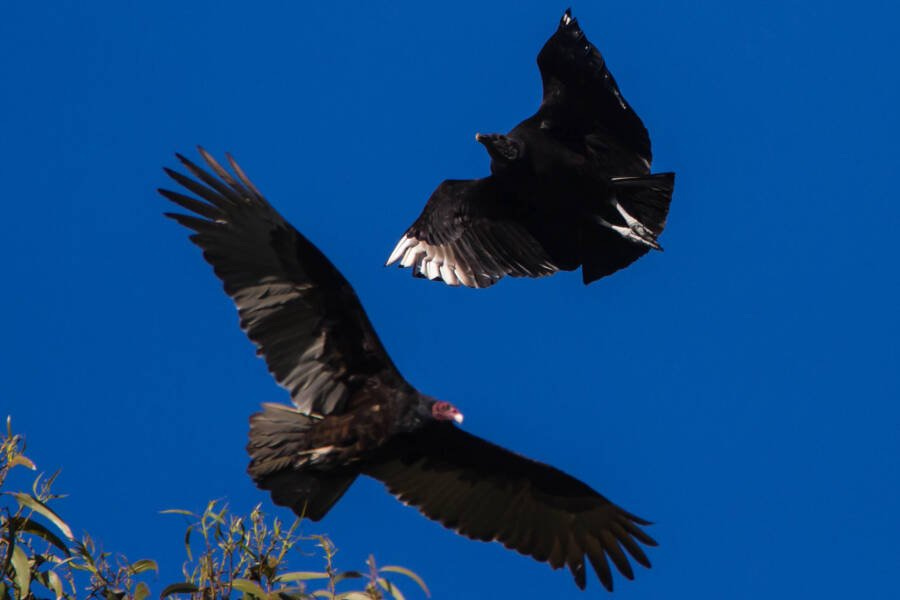Where have all the Vultures Gone?
Experts say Nigerian vultures go extinct through use for ritual purposes. But could climate change not be an underlying cause of the problem?
White-backed vulture, Credit:Richard Steyn
Recently, the Nigerian Conservation Foundation (NCF) at a seminar to commemorate the World Migratory Bird Day reported that five out of the seven species of vultures found in Nigeria risk extinction. Mohammed Garba Bolyi, Head, (NCF) Northern Region, said the vultures are not seen anywhere and so are ‘critically endangered.’
According to the Guardian in November, the use of a nonsteroidal anti-inflammation drug, dictofenac, for the treatment of cattle, poisons the vultures on a mass level, leading to the risk of their extinction
“Diclofenac, originally developed for human use only, is cheap and effective to farmers,” Temi Bamgbose, an agriculture extension worker, said to the Guardian. “A multidisciplinary team of experts must work together to end this killings before the consequences become obvious.”
Another account say the demand for vulture parts in Nigeria for rituals, as well as urbanization, has caused a nearly 90% decline in the population of vultures in Nigeria.
“Across Africa,” wrote Vivian McCall on National Geographic in 2015, “vultures are electrocuted by power lines or crushed by wind turbines. Their brains are ground to snuff by witch doctors who believe the substance has magical powers. They die after eating pesticide-laced carcasses intended for lions and other predators. As a result, the vulture population is plummeting.”
Poisoned vultures, Credit:Charlie Hamilton
People shouldn’t be surprised about their views. Traditionally, the decline of vulture populations in Nigeria has been explained by large- scale use of vultures for ritual purposes, decreased access to food, various sources of unnatural mortality, especially poisonings, electrocutions, and collisions, or habitat loss that occurs throughout the country. However, the fate of the Cape and Bearded vultures in Lesotho, South Africa, and Kenya forces one to reassess the challenges faced by vultures. Their disappearance seems to be consistent with global warming trends that we see in the extinction of other animals.
Vulture market, Credit: J. Onoja
The two northernmost colonies of Cape vultures in South Africa have become extinct, though the vultures in the southern colonies show expansion. Also, the lowland breeding sites of Cape and Bearded vultures have disappeared first around Lesotho, forcing the species range to move upwards into the highlands, while the equatorial populations of Bearded vultures in Kenya have gone extinct. The events took place when the earth’s temperature rose to record levels.
“Climate change may work in concert with these other factors to change habitats and ultimately reduce prey populations. We suggest tests involving north-facing colonies that can further tease apart the direct negative influences of climate change over poisons, food reduction and habitat loss,” wrote Robert Simmons on Researchgate in 2007 in an article titled Is climate change influencing the decline of Cape Vultures and Bearded Vultures in southern Africa
Events in other parts of the world indicate that climate change may work in concert with other factors to lead either to the disappearance of vultures or a modification of their behavior.
Vultures driven by climate change to invade Pennsylvanian town, Credit: Wikimedia Commons
According to Mail Online, a growth in the population of vultures has occurred in Kentucky, U.S.A., with most of the animals attracted by the warmer winter temperature which they cherish. According to Hugh Powell in 2012 on Cornell Chronicle, black vultures have spread further north, wintering as far as Massachusetts, where the minimum temperatures are similar to their traditional habitat. Unfortunately, the influx of vultures in Kentucky leads to a widespread loss of cattle. Vultures, according to another report, pressured by climate change, have been sighted flying on hot air thermals from the east coast of the United States, all the way south to nearly the southern part of South America.
Meanwhile, due to the pressure of climate change, the African Rupell’s vultures, even though they lack a definite breeding record in Europe, frequently visit southern Europe, and even try to breed with griffon vultures, which are indigenous to Europe.
In other words, having suffered from pressures of climate change in places like Nigeria, the birds take refuge in Europe as a form of behaviour change.
Again, severe winter temperature proves to be the major factor in the northern spread of vultures.
Through satellite tracking, researchers follow the movements of vultures, and they prove invaluable to assess the behavior for instance of the turkey vulture. A study using this method found that climate change resulting in warmer summers increases the sizes of breeding ranges of vultures in north and south America.
Another research shows that climate change may have a negative effect on vultures, especially as warmer winter temperatures become more common.
“There is a problem, because birds are among the most mobile of animals, and yet they took decades to respond to warming,” Frank la Sorta, a post-doctorate researcher at the Cornell Lab of Ornithology, told Cornell Chronicle.
They also say that the overall impact of climate change can be more severe when it occurs with other major threats such as habitat loss and the reduction in available food resources.
An indication that African vultures may be modifying their behavior as a result of climate change can be seen in relation to the Egyptian vulture. In June, the British Broadcasting Corporation (BBC) reported its sighting in England, the only third Egyptian vulture ever seen in the wild in Britain since 1868. There had been two official sightings recorded in the UK - one in Somerset in 1825 and another in Essex in 1868.
Egyptian vulture seen in England, Credit:Will Wagstaff
Prof Stuart Bearhop, an ecologist with the University of Exeter, told the BBC: "If proven to be of wild origin then it would be the first sighting for 150 years, maybe a bit longer. It's an incredibly rare sighting. I think people will travel to see it, people are looking at it as a once-in-a-century bird.”
The Bearded vulture arrived unexpectedly in Derbyshire, according to an article by Chris Baynes in the Independent in July 2020. Many birds are shifting their range northwards because of rapidly warming temperature. Some land on the French coast, not willing to pass over the Channel.
Burak Bir, writing for World, Life in 2019, acknowledged that vultures play an important role in the environment, describing them as the garbage men of the nature, because they eat dead animals and clean the environment.
However, he also wrote, “Bearded vultures, one of the vulture species known to live in the highlands, die due to extreme temperature rise that restrains their habitat.”
African vultures fleeing the effects of the climate change migrate to countries such as Turkey to breed and feed during summer.
To show the effects of climate change, investigators of University of Malaga, identified Juanita, belonging to the Ruppel species, thought to be in danger of extinction due to climate change. Some of the birds come to Europe by following the Griffon vultures that spend the winter months in Africa, with about 8,000 to 9,000 crossing into Europe, with many African vultures integrating with them.
Juanita, Credit: Antonio Tomayo
Tara Osborne also shows how climate change affects African vultures, including the Nigerian white-backed vulture.
“The birds are at odds with the environment for their survival. Chicks are not able to fend for themselves,” she wrote in Gateway in 2019.
“Last year, when we looked at the number of hatching chicks, we noticed huge drops in the numbers with the current environmental conditions, the survival rate are poor,” said Kerri Wolton of the Southern African Vulture Conservation Programmme NGO in the same article.
Climate change can allow similar species that previously did not coexist to begin new interactions. For example, Vultur gryphus and Coragyps atratus did not coexist. But today, possibly as a result of climate change, shifts in behavior have occurred in the distributions of both species, as they have now created areas where they now mingle.
“Through ecological niche modeling, we evaluated the possible effects that future scenarios of climate change and human influence would have on the distribution and sympatry between the two species. Our models predict that the current distribution of V. gryphus will be reduced between 18% and 24% by 2050 and between 21% and 32% by 2070. Additionally, we predict that the distribution of C. atratus will be reduced by 31–52% by the year 2050 and 15–60% by 2070. The two algorithms predict a reduction in the areas of sympatry,” wrote Jimenez, Soto, Torres, Meyer and Sheppard in their research published in Cambridge Core earlier in 2021.
Climate-driven environmental transformation and land-use change impact on vultures, but these interactions have received little scientific attention, according to Santangeli, Spiegel, Bridgeford, and Girardello in their 2018 paper for Pub Med.Gov.
“We show that body condition of white-backed vulture nestlings decreased through the study period and was lowest inside protected areas. For the lappet-faced vulture, nestling condition was improved during harsh years with lower than average vegetation greenness assumed to result in increased ungulate mortality, but only within protected areas,” they wrote in the Pub Med.Gov. article
Furthermore, climate change impacts the ecology and population sizes of vultures in many ways. It does this through altering ranges, interactions, phonologies, having telling effects on the ability of vultures to tolerate temperature and other indices of weather. Experts say climate change will place additional challenges on birds like vultures, since we have refused to moderate climate change in the short term.
“Other species will increase in abundance as conditions become more favourable for them. The rapidity, scale, and impacts of climate change require that conservation biologists adjust the practices used to manage species in light of climate change,” wrote Miller-Rushing, Primack, and Sekercioglu in a research for the University of Utah.
The scavenging lifestyle of vultures gives them a bad reputation, however, nature and society benefits from just this behavior. Though they’re persecuted and overlooked as lowly scavengers, the environment they live understands that they play a crucial role
“Human race has encountered many viruses like COVID-19,” said S. Bharathidasan, founder of Arulagam, in The Hindu in May 2021. “Our rich biodiversity plays a huge role in keeping the germs at check. Of the many organisms, vultures, as carcass feeders, play a significant role. Though there is no direct relationship between vultures and COVID-19, it’s high time we realised their importance and protected them. The scavenger birds hold the key for a natural mechanism of infection control.”
Though these birds’ appearance might seem repulsive, it’s their feeding pattern that creates revulsion. However, their carrion consumption helps humans to rid the environment of carcasses that, otherwise, would provide foul smells and scenery for a much longer period. How have animals become food for vultures? They may have died from disease or other human-related causes. However, the vulture’s digestive system has become highly acidic due to generation of scarvenging on dead animals. So now, it is able to neutralize bacteria and other harmful organisms that are consumed along with decaying flesh.
“Contrast this to coyotes, dogs, rats and a number of other animals that are “facultative scavengers,” a term applied to animals that have scavenging as only part of their diet. These animals have less potent digestive systems, and, as a result, they often end up as carriers of bacteria they ingest instead of killers of it,” wrote Francis Skalicky for the Missouri Department of Conservation
In sum, Nigerian researchers and others worldwide should not assume that climate change isn’t among the major factors that cause either the disappearance or behavioral modification of vultures. Instead, they should seek for initiatives aimed at making the animals survive within conditions of the present situation.
One idea to save vultures is by organising healthcare campaigns offering vaccinations and basic treatment to families. This would hopefully deter people from the practice of eating vulture body parts recommended by dubious healers.
Conservationists could invest their funds in places like Nigeria where vultures face extinction due to climate change.
The Bulgarian scientist emphasizes that only a very small part of the money goes into the birds themselves (for tracking devises, supplementary food etc).
“Practically all the money is invested in people offering environmental education and conservation jobs to locals along the way of the vultures’ migration,” he said.
Thanks for reading Adetokunbo Sees! Subscribe for free to receive new posts and support my work.
Comment below.
Share this piece.









